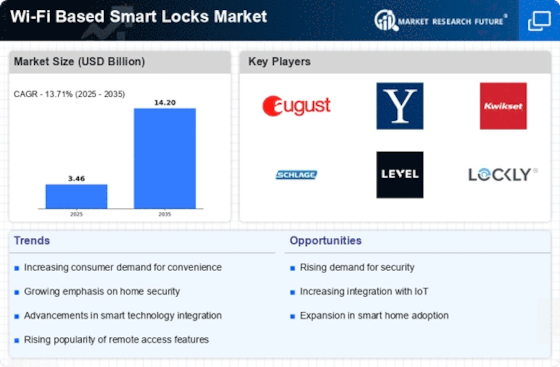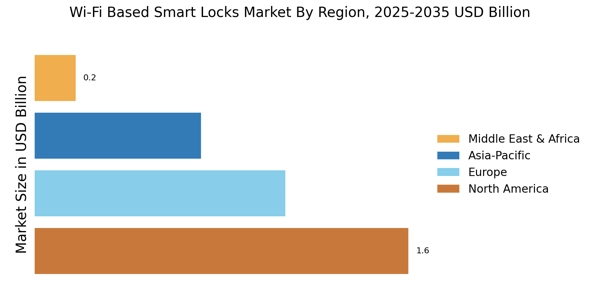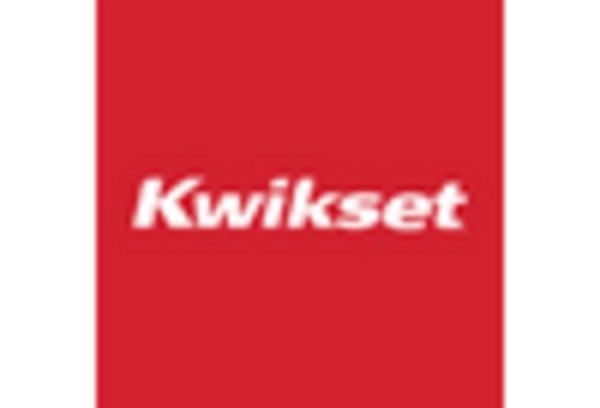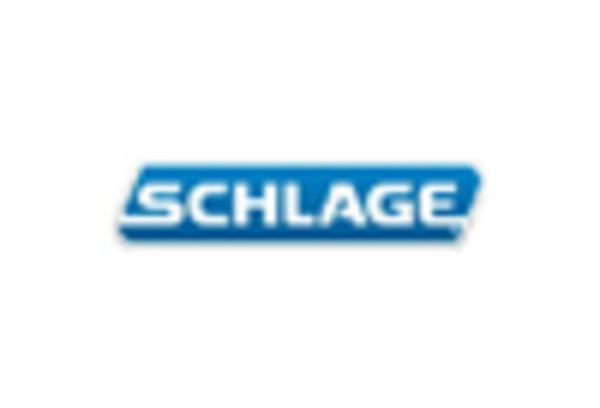Integration with IoT Devices
The integration of Wi-Fi Based Smart Locks with Internet of Things (IoT) devices is a crucial driver for the Wi-Fi Based Smart Locks Market Industry. As IoT technology continues to advance, smart locks are increasingly being designed to work seamlessly with other connected devices, such as security cameras, alarms, and home automation systems. This interoperability enhances the overall functionality of smart locks, allowing users to create comprehensive security solutions tailored to their needs. The market is witnessing a growing trend towards smart home ecosystems, where devices communicate and operate in harmony. This integration not only improves user experience but also drives consumer interest in smart locks. As the IoT landscape evolves, the Wi-Fi Based Smart Locks Market Industry is likely to benefit from the increasing demand for interconnected security solutions.
Rising Demand for Home Automation
The increasing trend towards home automation is a primary driver for the Wi-Fi Based Smart Locks Market Industry. As consumers seek to enhance their living environments with interconnected devices, smart locks have emerged as a crucial component. The market for smart home devices is projected to reach substantial figures, with smart locks representing a significant share. This demand is fueled by the desire for convenience, security, and energy efficiency. Homeowners are increasingly inclined to invest in smart locks that can be integrated with other smart home systems, such as lighting and security cameras. This integration not only enhances the functionality of the locks but also provides a seamless user experience. As a result, the Wi-Fi Based Smart Locks Market Industry is likely to witness robust growth, driven by the broader adoption of home automation technologies.
Increased Awareness of Home Security
The heightened awareness of home security issues is a significant driver for the Wi-Fi Based Smart Locks Market Industry. As crime rates fluctuate, homeowners are increasingly prioritizing security measures to protect their properties. This awareness has led to a growing interest in smart locks, which offer advanced security features compared to traditional locks. The market is witnessing a shift as consumers seek solutions that provide not only physical security but also digital monitoring capabilities. The integration of smart locks with mobile applications allows homeowners to monitor their properties remotely, further enhancing their appeal. As security concerns continue to rise, the Wi-Fi Based Smart Locks Market Industry is likely to experience sustained growth, driven by the demand for innovative security solutions.
Convenience and Remote Access Features
The convenience offered by Wi-Fi Based Smart Locks is a compelling driver for the Wi-Fi Based Smart Locks Market Industry. Consumers are increasingly drawn to the ability to control their locks remotely through smartphones and other devices. This feature allows users to grant access to guests, monitor entry, and receive notifications in real-time. The growing trend of remote access is particularly appealing to busy professionals and families, who value the flexibility and control that smart locks provide. Market data indicates that the demand for smart locks with remote access capabilities is on the rise, as consumers seek solutions that simplify their lives. Consequently, the Wi-Fi Based Smart Locks Market Industry is expected to expand, fueled by the increasing preference for convenience and accessibility.
Technological Advancements in Security
Technological advancements play a pivotal role in shaping the Wi-Fi Based Smart Locks Market Industry. Innovations in encryption, biometric authentication, and remote access capabilities have significantly enhanced the security features of smart locks. These advancements address consumer concerns regarding safety and privacy, making smart locks more appealing. The market has seen a surge in products that offer advanced security features, such as real-time alerts and remote locking capabilities. According to recent data, the adoption of smart locks with advanced security features is expected to increase, reflecting a growing consumer preference for enhanced protection. As technology continues to evolve, the Wi-Fi Based Smart Locks Market Industry is poised for growth, driven by the demand for more secure and reliable locking solutions.

















